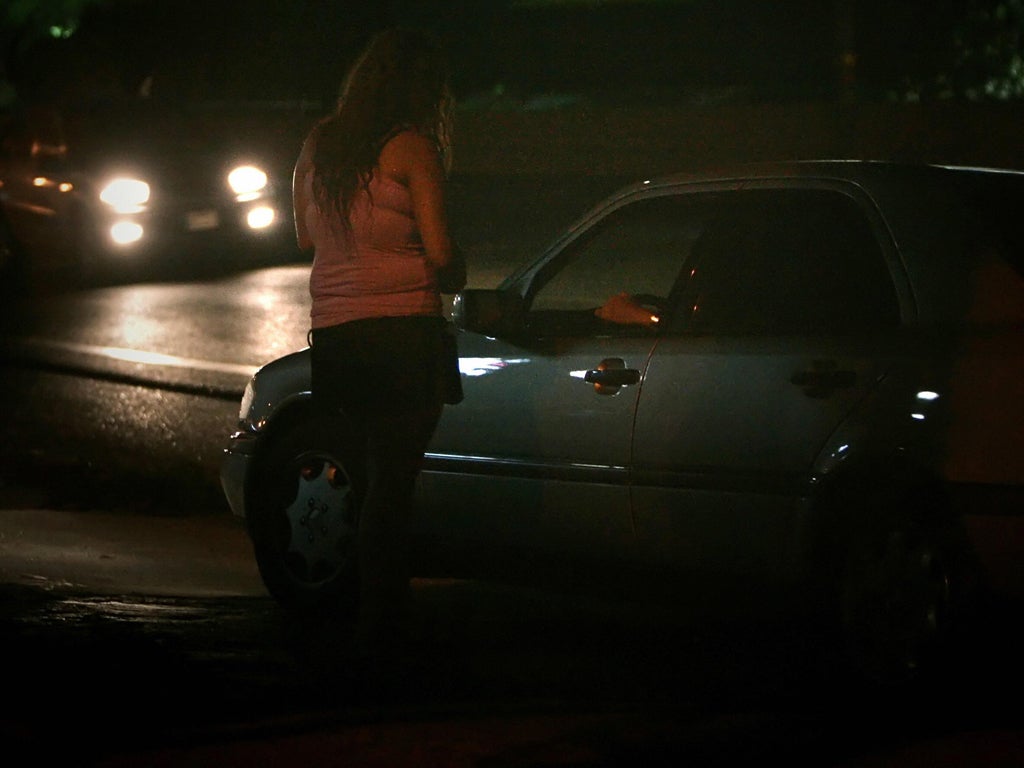Prostitution: We need to see paying for sex as violence rather than vice
The so-called ‘oldest profession in the world’ is too often viewed with a salt-of-the-earth fondness

Today is International Day for the Elimination of Violence against Women. Created in 2000, the event is used to campaign against rape, domestic abuse and issues like female genital mutilation which ritualise the torture of girls. It focuses on almost all the myriad ways in which women are brutalised or subjected to suffering; the kaleidoscope of vile forms physical misogyny can take.
Yet one thing that doesn’t come up often enough when we discuss violence against women is prostitution. Despite frequent reports of prostitutes being trafficked, enslaved, raped or beaten, men who indulge in the sex trade get a free pass. They may be seen as cheeky or flawed – just look at Russell Brand – but they are unlikely to be viewed as colluders in exploitation. It suits us, as a society, to treat buying sex as vice rather than violence. Seedy and a little wild? Yes. A form of abuse? Not really.
Journalist and women’s rights campaigner Joan Smith has written extensively about the abuse suffered by women in prostitution. In one account she describes a woman who was partially blinded by a beating and then forced to wear an eye patch and go on working. “No man who had sex with this woman could have thought it was consensual,” Joan told me when I met her this month. “Yet many did so anyway.”
This study shows nine out of ten prostitutes would escape the industry if they could, and even when stories don’t involve physical abuse there is usually evidence of socio-economic coercion. For me there is an implicit violence in purchasing a physical commodity from someone who doesn’t want to sell it.
Yet the mythology surrounding prostitution is strong. The so-called ‘oldest profession in the world’ is viewed with a salt-of-the-earth fondness. When a celebrity is found to have used a prostitute it is treated no worse by the media than an extra-marital affair. And the articulate 11 per cent of women in the sex trade who say they are there voluntarily receive a great deal more airtime than the 89 per cent who do not (just look at the Belle de Jour). We appear to like the idea of the ‘happy hooker’.
This is often reflected in law. Neither the blanket criminalisation we have in Britain nor the blanket legalisation in Holland and Germany acknowledge the exploitative nature of the sex trade. The UK system institutionalises prostitutes by criminalising them, while the Dutch Model has, according to international women’s charity Equality Now, “empowered buyers, pimps and traffickers”.
Next month I will be reporting to my colleagues on the European Parliament’s Women’s Rights and Gender Equality Committee on how we can address prostitution. I favour the Swedish Model, a middle way which permits selling sex but criminalises buying it. The approach was introduced in Sweden in 1999. Not only has it halved street prostitution and reduced trafficking, but it has also successfully stigmatised using the sex trade, with Swedish men now three times as likely to oppose paying for sex. By distinguishing between buyers and sellers the Swedish Model recognises, in a way no other system does, the fundamental violence that takes place when a man buys sex from a women who is not – as the vast majority of women are not – selling it through genuine choice.
The committee will vote on the Swedish Model in January, with the hope that it will be endorsed by the full European Parliament later in 2014. With Iceland and Norway already using the system – and France, Ireland and Northern Ireland drafting legislation to follow suit – the centre of gravity is moving.
Nevertheless, it will be difficult to achieve in Britain. The Swedish Model is easy to argue ethically but difficult to achieve politically. Legalising the sale of sex but criminalising the procurement is a nuanced approach. It runs up against opposition on both sides – from the social conservatism of Middle England and the libertarianism of the economic right. The former will oppose the legalisation of either purchasing or purveying, and therefore favour the UK status quo; the latter are likely to argue that both should be decriminalised, and say we should adopt the laissez-faire Dutch Model.
As I and colleagues try and build support for the Swedish Model it will be important that we include rather than alienate both of these parties. We must emphasise what we have in common rather than where we are different.
A wider recognition of prostitution as a form of abuse is the first step to doing this, and it is a process which starts today. I hope that by November 25 next year there will be a far wider acknowledgement of the violence inherent in buying sex.
Mary Honeyball is MEP for London and Labour spokesperson for women in Europe. She tweets at @maryhoneyball
Join our commenting forum
Join thought-provoking conversations, follow other Independent readers and see their replies
Comments
Bookmark popover
Removed from bookmarks